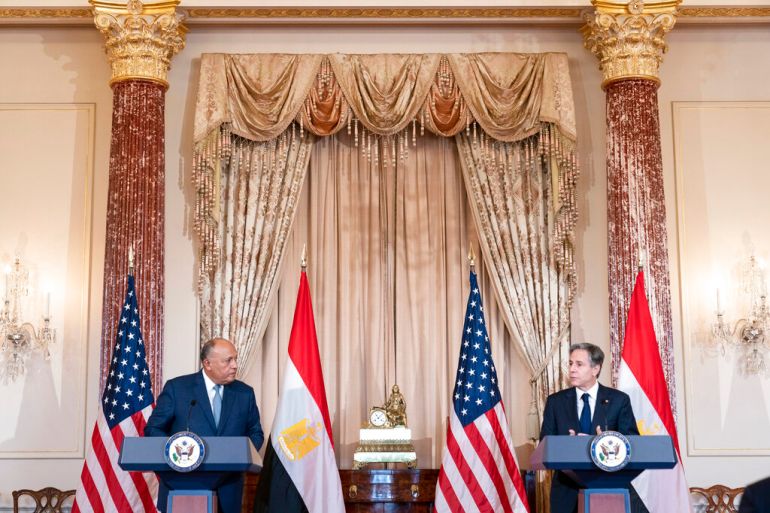US raises Egypt’s rights record as ‘strategic dialogue’ begins
Human rights and a multitude of regional issues will be discussed during two-day talks in US, Antony Blinken says.

US Secretary of State Antony Blinken and his Egyptian counterpart Sameh Shoukry have started a round of “strategic dialogue” in Washington that they say will address bilateral ties, human rights and a multitude of regional issues, including the Israeli-Palestinian conflict.
At a news conference alongside Shoukry on Monday, Blinken said diplomats from Egypt and the United States would “cover a wide range of issues” during two days of talks on Monday and Tuesday, including the military takeover in Sudan and efforts to revive the nuclear deal with Iran.
Keep reading
list of 3 itemsEgypt’s el-Sisi lifts state of emergency in force since 2017
UN accuses CAR troops of wounding 10 Egyptian peacekeepers
The top US diplomat also lauded Cairo’s role in mediating a ceasefire between Israel and Palestinian groups in Gaza in May.
“Making tangible and lasting improvements on human rights is also essential to strengthening our bilateral relationship, and the United States will continue to support those efforts,” Blinken told reporters.
The dialogue came as human rights groups urged the Biden administration, which pledged to put human rights at the centre of US foreign policy, to take a firmer stance against Egypt over the country’s human rights record.
Rights groups have accused the government of Egyptian President Abdel Fattah el-Sisi, who came to power in a 2013 military coup, of jailing tens of thousands of dissidents and outlawing virtually all forms of political opposition. Cairo has denied holding political prisoners.
On Monday, Blinken welcomed Egypt’s National Strategy on Human Rights, a long-term plan that the Egyptian government launched earlier this year, which has been received with scepticism by many rights advocates.
For his part, Shoukry said it ultimately would be up to the Egyptians to decide the “political, social and economic system” that ensures their welfare.
“We also believe that human rights are an interdependent whole, which necessitates that we dedicate equal attention to political rights and civil liberties, and economic and social rights,” the Egyptian foreign minister said.
“This is an evolutionary process unique to each country, one that reflects and takes into consideration its social specificities, developmental realities, religious background and cultural characteristics.”
US-Egypt relations
Egypt has for decades been considered a linchpin in the US’s Middle East policy due to Cairo’s influence in the Arab world, control over the crucial Suez Canal, and the country’s land border with the Gaza Strip.
But during his campaign for the White House, US President Joe Biden promised “no more blank cheques” for el-Sisi, who had maintained a close relationship with Biden’s predecessor Donald Trump. Then, in March, the Biden administration joined other Western nations in rare public criticism of rights abuses in Egypt.
Nevertheless, Blinken travelled to Cairo in May, after the Egyptian government helped broker a ceasefire to end a deadly escalation between Palestinian groups in Gaza and Israel. In a call with el-Sisi, Biden also thanked Egypt for its “successful diplomacy”.
The Biden administration has continued to face calls in Washington to do more to pressure Egypt – which receives $1.3bn in US military aid annually – on its human rights record, however.
Amid the criticism, the administration said in September that it would withhold $130m in assistance to Egypt, releasing the funds only if el-Sisi ended the prosecution of rights groups and civil society organisations. It also demanded the release of 16 US prisoners.
The announcement came as el-Sisi launched the National Strategy on Human Rights, presented as a five-year plan to address abuses committed in the country. El-Sisi also lifted a state of emergency in place since 2017 that gave the government sweeping authority. However, legislation making its way through Egypt’s legislature would reinstate some of those powers.
‘Shared interest’ on Sudan
Seth Binder, director of advocacy at the Project on Middle East Democracy (POMED), a Washington-based advocacy group, called on the Biden administration to pursue a more questioning approach to Egypt.
“As the US engages in this strategic dialogue, the administration must address the fact that Egypt frequently acts in opposition to US interests, from supporting the military coup in Sudan, to maintaining one of the most repressive regimes in the world,” Binder told Al Jazeera.
Nevertheless, Blinken said on Monday that the US and Egypt have a “shared interest” in restoring the democratic transition in Sudan, where General Abdel Fattah al-Burhan on October 25 dissolved the transitional government and detained other officials and political leaders in a coup.
The situation in Sudan will be on the agenda during the “strategic dialogue”, as will the ongoing conflict in Libya and possible talks on Israel-Palestine mediation, the US secretary of state told reporters.
“The military takeover that began on October 25 has been dangerously destabilising,” Blinken said.
“A restoration of the civilian-led transitional government is the only path to facilitating the aspirations of the Sudanese people who have demonstrated remarkable bravery in repeatedly coming out in demand for democracy.”
Pressed about Blinken’s statement that Washington and Cairo have “shared interests” in Sudan, State Department spokesperson Ned Price told reporters later on Monday, “I will leave it to Cairo to explain their position on Sudan.”